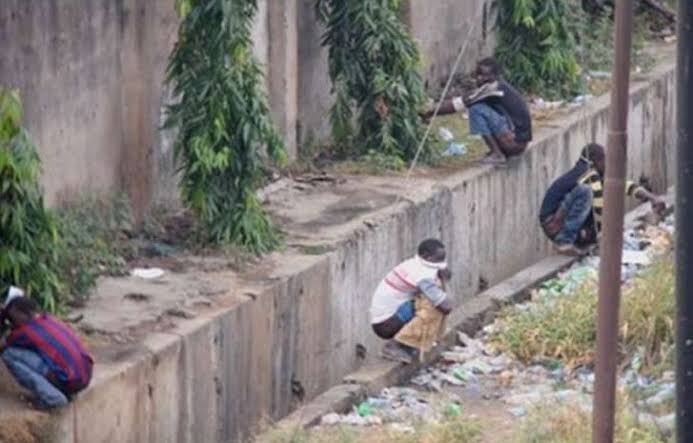- Agency Report
Some council chairmen and stakeholders in Lagos State on Monday, warned residents against open defecation, insisting that offenders would be punished.
They told the News Agency of Nigeria (NAN) in separate interviews that open defecation could be dangerous and could be the easiest way to contact diseases.
NAN recalls that the Federal Government on Sept. 12 said that the country required more than 20 million toilet facilities to combat open defecation.
Mrs Chizoma Opara, the Deputy Director of the “Clean Nigeria: Use the Toilet” campaign, Federal Ministry of Water Resources and Sanitation, corroborated this in an event in Lagos.
The Chairman, Ikorodu Local Government, Mr Wasiu Adesina, said he would punish anyone caught indulging in the act.
Adesina urged residents to adhere to the council’s sanitation rules, adding that his administration had built 20 more public toilets to complement existing ones.
He said that this would help in discouraging open defecation.
The council chairman said that it became imperative to curb open defecation to curtail outbreaks such as cholera and other diseases in the country.
He also warned residents to desist from indiscriminate dumping of refuse, noting that it could lead to blockage of the drains
Also, Mr Kazeem Sulaimon, the Chairman, Ikorodu West Local Council Development Area (LCDA), urged residents to continue to imbibe good sanitary practices to avert outbreak of diseases.
Sulaimon appealed to residents to ensure proper maintenance of public toilets in places such as markets, motor parks, schools and other places.
The council boss emphasised the importance of clean environment, observing that it would contribute significantly to good health.
Mr Lateef Rasheed, the Chairman, Nigeria Bar Association (NBA) Badagry, also urged government to ensure that every house and business centres had convenient toilets and to enforce it.
According to him, government should also increase sensitisation of the people to the disadvantages of open defecation, particularly “as it affects lives.
“We can put a stop to it if all houses have good toilets. How do you build a house without a toilet?
“Research have shown that most of those involved in open defecation are from compounds without toilets.
“Nobody wants to put his money down to repair damaged toilets”.
Mr Babatunde Ajose, a tourism expert and resident of Marina in Badagry, said that open defecation “is a cultural practice in Badagry riverine communities.
“Yes, we have open defecation in Badagry like every other riverine community in West Africa.
“It is like a cultural practice that people find it difficult to see anything wrong or dangerous in it.
“Growing up, I practide open defecation because my family compound is opposite the lagoon.
“It was a usual practice for us children and teenagers to go to the marina early in the morning to defecate.”
According to him, Badagry marina is like the meeting place or square for people of various ages to meet from time immemorial.
“Then, very early in the morning, the children and teenagers will bring out our waste bin to empty on several dump sites along the Marina; thereby, using the opportunity to defecate, play and swim.
“The women will come in the afternoon to meet the fishermen to make purchases, the men will take the evening turn after work to meet and discuss about the community.
“Open defecation at the Marina is one of the habits that is commonly practised as part of coastal life,” he said.
Ajose, however, urged the government to organise sensitisation programme for residents of Marina to education them on the menace of open defecation.
“I sincerely agree that there is the need for provision of toilets for people along the Badagry Marina to reduce it.
“It is a habit that is part of our coastal cultural life and the only approach that can eradicate it is strategic and continuous education, community engagement and sensitisation which can bring shift change of habit.
“Up till this present moment, I know people who will never use their toilets at home but prefer to defecate in the marina because it makes them feel big and culturally strong,” he said.
Mr Ademola Mustapha, Badagry District Scout Officer, said open defecation remained a big challenge in the area, especially riverine areas.
He observed that in Badagry, the government should build more public toilets and ensure that “they are well-maintained.
“There should also be more sensitisation to the importance of proper waste disposal and hygiene.
“Government should help households in building latrines and establish effective waste collection and disposal systems.
“There should be collaboration among local governments, communities and organisation to address the issue”.
The Baale of Ojogbe in Ikorodu, tasked residents against open defecation as the easiest way of combating spread of diseases and controlling other environmental crises.
He called on the residents to prioritise sanitation and hygiene to curb the spread of any disease outbreak.
According to him, sanitation and hygiene are the cheapest ways of ensuring good health.
“Open defecation has become a menace in the society and as such, needed to be tackled for good health,” he said. NAN


